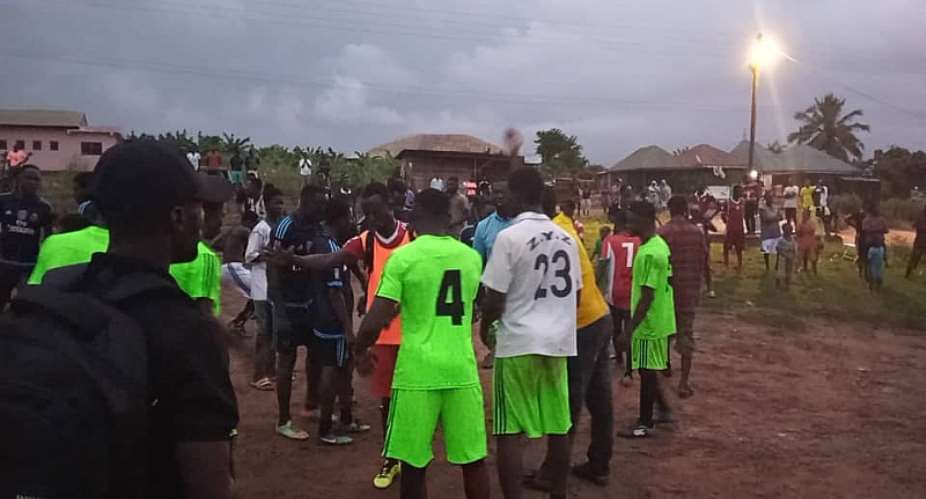On October 10, 2021, Mensah Mental Health Rehabilitation Project (MEMHREP) decided to celebrate the World Mental health Day (WMHD) by organising a football gala at Ekyem park in the Ejisu municipality in Ghana. The main reason behind this was to engage the youth on mental health awareness and prevention of drugs and alcohol abuse.
The first match started at 2:00pm by the Aboboyaa and Ekyem town teams. They played 25minutes for the first half with Aboboyaa winning by 1:0. The second half ended with scores 2:2, after which the Aboboyaa team won by penalties 3:2. Various teams took part with 55players.There were several community and religious groups, and leaders present at the event. At around 5:00pm, the match ended, and all players were refreshed.
After the first 2 matches, all the players from the various teams came together, as well as everybody present. Hon. Emmanuel Baidoo (Bonwire Assemblyman) and Mrs. Mary Ocansey (Community Mental Health Nurse) spoke on the causes and prevention of mental illness, as well as ‘Mental Health in an Unequal World’.
Mr. Adu Gyamfi, Founder and CEO of MEMHREP, sent a message to the attendees, stressing the need to treat psychological struggles the same way as physical ones. He further appealed for respect for human rights of people living with mental health conditions.
The theme for the World Mental Health Day, 2021 is ‘Mental Health in an Unequal World’. The world is increasingly polarized, with the very wealthy becoming wealthier, and the number of people living in poverty still far too high.
2020 highlighted inequalities due to race and ethnicity, sexual orientation and gender identity, and the lack of respect for human rights in many countries, including for people living with mental health conditions. Such inequalities have an impact on people’s mental health.
This theme, chosen for 2021, will highlight that access to mental health services remains unequal, with between 75% to 95% of people with mental disorders in low-and middle-income countries unable to access mental health services at all, and access in high income countries is not much better. Lack of investment in mental health disproportionate to the overall health budget contributes to the mental health treatment gap.
Many people with mental illness do not receive the treatment that they are entitled to and deserve and together with their families and carers continue to experience stigma and discrimination. The gap between the ‘haves’ and the ‘have nots’ grows ever wider and there is continuing unmet need in the care of people with mental health problem.
Reverend John Awuah prayed for the teams and requested MEMHREP to organise such events frequently. He further appealed to all to show respect for persons with mental health conditions. He further appealed to the general public to support MEMHREP’s activities.





 This IMANI job no dey pap; the people you are fighting for are always fighting y...
This IMANI job no dey pap; the people you are fighting for are always fighting y...
 Prof. Naana Opoku-Agyemang has changed; you can see a certain sense of urgency –...
Prof. Naana Opoku-Agyemang has changed; you can see a certain sense of urgency –...
 MFWA Executive Director slams Akoma FM for engaging in ‘irresponsible’ media pra...
MFWA Executive Director slams Akoma FM for engaging in ‘irresponsible’ media pra...
 ‘Women must become millionaires too’ — Prof Jane Naana on establishment of Women...
‘Women must become millionaires too’ — Prof Jane Naana on establishment of Women...
 Some believe only in Ghanaian votes, not Ghana — Kofi Asare jabs politicians
Some believe only in Ghanaian votes, not Ghana — Kofi Asare jabs politicians
 Plan to make BEST sole aggregator of Sentuo Oil Refinery will create market chal...
Plan to make BEST sole aggregator of Sentuo Oil Refinery will create market chal...
 2024 elections: I can't have the man I removed from office as my successor — Aku...
2024 elections: I can't have the man I removed from office as my successor — Aku...
 2024 Elections: Immediate-past NPP Germany Branch Chairman garners massive votes...
2024 Elections: Immediate-past NPP Germany Branch Chairman garners massive votes...
 Gov’t focused on making Ghana energy self-sufficient, eco-friendly – Akufo-Addo
Gov’t focused on making Ghana energy self-sufficient, eco-friendly – Akufo-Addo
 April 25: Cedi sells at GHS13.74 to $1, GHS13.14 on BoG interbank
April 25: Cedi sells at GHS13.74 to $1, GHS13.14 on BoG interbank
